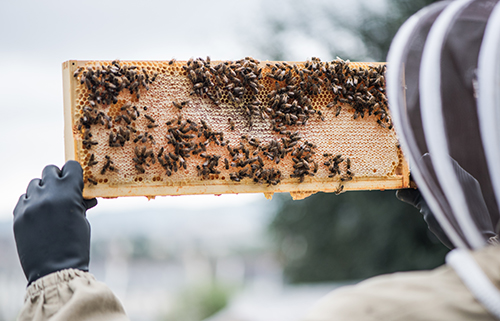Winter Beekeeping
Jan 23, 2023

As the temperatures drop and the flowers die, people often wonder what becomes of honeybees. Unlike many other insects, though, bees do not hibernate during the winter and instead stay active all year long. So, what are they doing during this time?
Once temperatures drop below 55 degrees, honeybees retreat to their hive to form a cluster around the queen. Their primary goal is to protect the queen until spring, and the colder the temperature gets, the tighter the cluster will become. To keep the hive and queen warm, bees will shiver and flap their wings to increase the internal temperature of the hive, keeping the queen around 96 degrees.
As you can imagine, it takes a lot of energy for bees to keep the hive warm, and although they rotate duties so as not to get worn out, they will likely rely on your help to provide them with some extra fuel.
Regardless of how mild the winter is, you must leave honey for your bees. Typically, beehives need approximately 30 pounds of honey to last until spring. There is no need to provide water inside the hive, though. Humidity inside the hive will create condensation on the sides of the boxes that bees can use. However, make sure there isn’t so much condensation that it begins to collect on the bees; proper ventilation should prevent this from happening.
Unless absolutely necessary, don’t open the hive when temperatures are below 40 degrees because you will allow all the warm air to escape. Instead, periodically tap on the outside of the hive and listen to whether there are bees buzzing inside to determine whether they are still alive.
Hay bales stacked around the hive can be used as insulation if the temperatures get too cold for a long period of time. Just remember to keep an eye out for rodents wanting to move in for the winter. Mice and rat traps can help this problem, as well as keeping your hive off the ground.
The most dangerous time of the year for your backyard bees is actually at the very end of winter, when bees begin to venture out of the hive to forage. Unfortunately, there is rarely any pollen and nectar for the bees, so they go back to the hive hungry. At this point, you will likely need to supplement their diet with fondant or syrup.
Many local Co-op’s carry backyard beekeeping supplies to keep your hive thriving through the winter! For more content like this, check out the latest issue of The Cooperator.
Once temperatures drop below 55 degrees, honeybees retreat to their hive to form a cluster around the queen. Their primary goal is to protect the queen until spring, and the colder the temperature gets, the tighter the cluster will become. To keep the hive and queen warm, bees will shiver and flap their wings to increase the internal temperature of the hive, keeping the queen around 96 degrees.
As you can imagine, it takes a lot of energy for bees to keep the hive warm, and although they rotate duties so as not to get worn out, they will likely rely on your help to provide them with some extra fuel.
Regardless of how mild the winter is, you must leave honey for your bees. Typically, beehives need approximately 30 pounds of honey to last until spring. There is no need to provide water inside the hive, though. Humidity inside the hive will create condensation on the sides of the boxes that bees can use. However, make sure there isn’t so much condensation that it begins to collect on the bees; proper ventilation should prevent this from happening.
Unless absolutely necessary, don’t open the hive when temperatures are below 40 degrees because you will allow all the warm air to escape. Instead, periodically tap on the outside of the hive and listen to whether there are bees buzzing inside to determine whether they are still alive.
Hay bales stacked around the hive can be used as insulation if the temperatures get too cold for a long period of time. Just remember to keep an eye out for rodents wanting to move in for the winter. Mice and rat traps can help this problem, as well as keeping your hive off the ground.
The most dangerous time of the year for your backyard bees is actually at the very end of winter, when bees begin to venture out of the hive to forage. Unfortunately, there is rarely any pollen and nectar for the bees, so they go back to the hive hungry. At this point, you will likely need to supplement their diet with fondant or syrup.
Many local Co-op’s carry backyard beekeeping supplies to keep your hive thriving through the winter! For more content like this, check out the latest issue of The Cooperator.